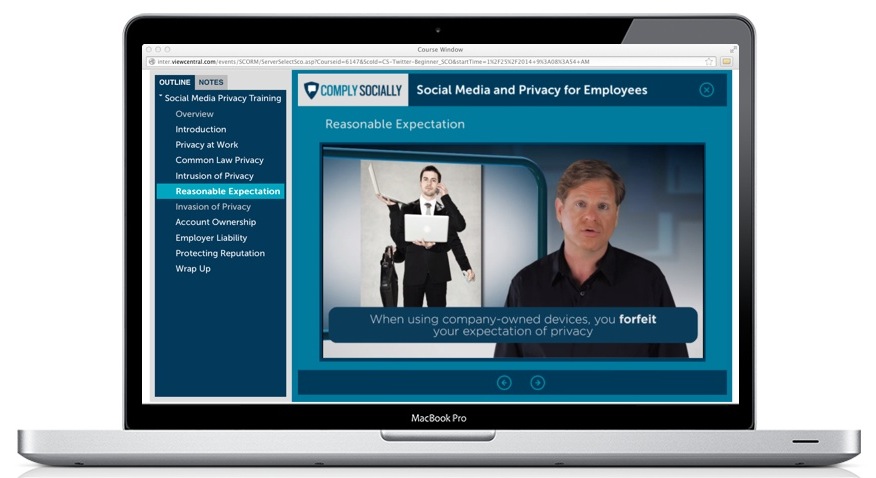 Guest Post by Eric Schwartzman
Guest Post by Eric Schwartzman
Advanced social media monitoring skills are a critical component of effective social media communications. This is why social media monitoring training is so important.
But with more and more monitoring platforms gobbling up big data, and as individuals become increasingly concerned about their personal privacy rights online, social media privacy training and social media surveillance training have become equally critical.
It’s becoming increasingly risky to empower workers to listen to social media conversations for work without providing mandatory privacy awareness training.
Here are the top 3 reasons why social media monitoring has become riskier than ever:
1. Monitoring is surveillance.
Most people would rather order “steak” than “cow.” It sounds a lot nicer.
By the same measure, “monitoring” sounds less sinister than surveillance, but they’re really the same thing. But you should know that when you monitor digital communications – even if they do take place in a public environment — you’re eavesdropping and there limits to what you can and can’t listen to.
In the U.S., much of the debate around privacy rights thus far has centered around whether the government’s right to listen in secrecy, and without a court order, is legal. I’ll leave it to the constitutional scholars to answer that question.
Let’s focus on employee privacy in the workplace.
Do employees have any right to privacy when using online tools and social media?
The short answer is yes.
But their rights are quite limited, and both employers and employees need to know where to draw the line to respect each other’s privacy rights to know certain things, and keep others private. We cover the specifics in our self-paced online social media privacy course.
In the U.S., our right to privacy comes from a number of sources including the U.S. Constitution. Although the Constitution doesn’t mention privacy specifically, the U.S. Supreme Court says the right to privacy can be derived from promises made by the 1st, 4th, 9th, and 14th amendments.
But you should also know that the U.S. Constitution mostly protects you from an invasion of privacy by the government.
It doesn’t really apply to relationships between employers and employees. That means, just because the NSA engages in questionable social media monitoring practices, employers don’t necessarily have the same rights.
2. Ownership impacts surveillance.
The hidden cost of using an employer-owned or -sponsored smartphone or laptop is – for the most part – the loss of your personal privacy.
If an employer owns any hardware (like computers and mobile devices) or software (like an interoffice messaging or voicemail application) or the network you access the Internet through, it can monitor their employees’ use, including personal files and communications that pass through that system.
But there are limitations.
For instance, employers can’t monitor employees continuously. If a Google Hangout is obviously personal, the employer has to stop listening, but that doesn’t stop an employer from disciplining employees for having personal conversations on social media or sending personal emails on the employer’s time during work hours.
Even though they have to stop listening to the conversation, employers are allowed to store meta data, like records of how long an employee used a network or phone system for personal communications, as well as who they called and when. In addition, an employer can monitor an employee’s address book and calendar … if they’re stored on an employer’s computer, network, or email service.
If the employee owns the system and hardware, the employer can sometimes view and obtain personal files, usually when the employee is using it at work, and if the employer has a legitimate interest in viewing the communication.
But organizations should make clear to their employees what their monitoring practices are, the rationale for monitoring employee communications, and why it’s necessary. So be upfront with your employees about your privacy policy. Tell them what you are going to monitor, and why.
3. Govern through knowledge, not fear
Not looking bad in public is the issue employers worry about most when it comes to their employees’ activities in social media. That really isn’t a legal issue, unless the employer is encroaching on workers’ rights, employee privacy, or creating the risk of liability by trying to control what employees do or don’t say in their personal social media accounts.
As I’ve explained in my book on B2B social media, “Social Marketing to the Business Customer,” successful branding via social media relies on empowering employees to speak on behalf of their employer in a way that is both authentic and conducive to building and maintaining long term customer relationships.
An organization’s reputation really depends on the quality of its products or services, the effectiveness of its marketing, what it’s like to work there, and how it does business with others.
The value of social media in the workplace is its ability to relay spontaneous and authentic communications. So all employees need a better understanding of their privacy rights, and managers need to know their surveillance rights, if employers expect them not to intrude on the privacy rights of each other.
Intel evolved from a chip maker engaged in social marketing to an actual social business by establishing an internal social media training program designed to teach any employee – not just those in marketing and PR – interested in raising their digital IQ.
Rather than launch a social media center of excellence where know-how is concentrated, they opted to build a social business at all levels of the enterprise through social media education for employees. Their objective was to tap the power of an internal advocacy program that enabled all employees to help prospects and customers via social networks.
Social media monitoring to spot the errors employees make when they disobey your social media policy – without providing useful privacy awareness training – creates a climate of fear that ultimately discourages anyone from evangelizing on behalf of their employer.
Today’s takeaway is that social media monitoring has become much more complex from a regulatory standpoint.
If you intend to leverage social networks for business gain, getting your people trained in how to listen to conversations is no longer enough. They need social media privacy and social media surveillance training as well.
 Eric Schwartzman is CEO of social media training provider Comply Socially. You can find and talk to him on Twitter and LinkedIn. Eric will join the #measurePR Twitter chat on Tuesday, March 4, 2014, from 12-1 pm ET., so save the date if you’d like to learn more about this subject.
Eric Schwartzman is CEO of social media training provider Comply Socially. You can find and talk to him on Twitter and LinkedIn. Eric will join the #measurePR Twitter chat on Tuesday, March 4, 2014, from 12-1 pm ET., so save the date if you’d like to learn more about this subject.








[…] understand your brand’s mission and voice. Together, build a communication strategy and a social media policy. In fact, as your business grows, a social media policy is a must. It gives everyone a framework […]
Get your own designed website for spread your business at very cheap cost it really helps your business to grow up for more details visit: (http://tinyurl.com/3gce3ot) ids (11688)
EricSchwartzman Hi Eric,
I think you assume too much re. reading the post (privacy is something I’m hugely interested in, from both a personal and professional aspect) :)
I wasn’t criticizing the post, just wanted to clarify the content, given brands’ interest in monitoring being different from HR/corporate interest in monitoring.
As I mention, I thought it was a great post with some excellent insights.
Great point about “not looking bad” rather than employee privacy being the major concern for employers when it comes to monitoring. But with the right employee education / compliance training program, it’s a win-win for everyone.
Until organizations and workers get this understanding, we’ll have to keep eating cows. Thanks, Eric. :)
We all know how much we Love
our Coffee, don’t we? Sure we do!! In the Morning especially! And I have Tried quite a Few, like most Americans
have. I was told, that this Coffee was
Different, and I said OK, Prove It to Me!
After trying just One Cup of this Stuff, I knew it was Different for
sure! It is made from these Beans, down
South, and I am not talking America here Obviously too. aroma, flavor, and health
benefits of this Coffee will Amaze you for sure. To create the world’s healthiest,
best-tasting coffee, we took coffee back to its roots–to the loamy, volcanic
enriched soil of ancient Panama. In combination with unique good-health
promoting and life-enriching ingredients, Sisel KAFFÉ will give your body it’s
daily boost while enriching even the most discriminating coffee lover’s
palate. It is just Amazing Stuff for
sure!! Take a Look at the Web Site below
for more Details on this Stuff too. We now, got a Coffee that wiu
http://www.HealthyCoffeeBean.com
Danny Brown In the age of the NSA PRISM program, the title was written to get you to consider the privacy and surveillance side of monitoring, which I don’t think enough people do. Codes of Conduct and Social Media Policies justify governance, but no one actually reads them. They sign for them and put them in the bottom drawer. If I led this article with either of those things in the headline, I’ll bet you never would have read it either. But I certainly don’t think it’s misleading. It’s just a nonspecific headline about 3 things you don’t know about social media monitoring. If I wasn’t able to deliver all 3, I hope you got at least one or two things out of it. And if not, my apologies. I gave it my best shot.
ShellyKramer Hey! Are you here yet? At #solopr, I mean.
Hi Eric, great post with some excellent insights into the employer/employee relationship.
This looks more like it’s about employee Codes of Conduct and Social Media Policy, though, as opposed to social media monitoring in general? Or, employee-specific monitoring?
The title would suggest a look at some of the ways social monitoring is used in the wider context of consumer and brand monitoring, versus keeping tabs on employee usage, and where the personal aspect starts and ends?